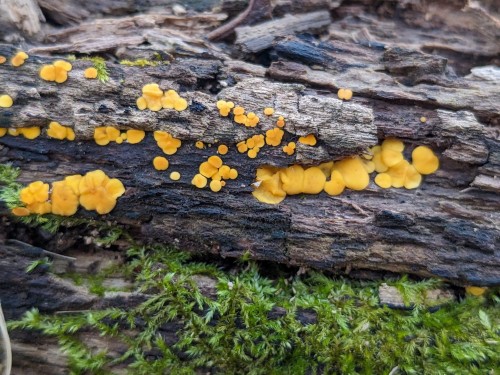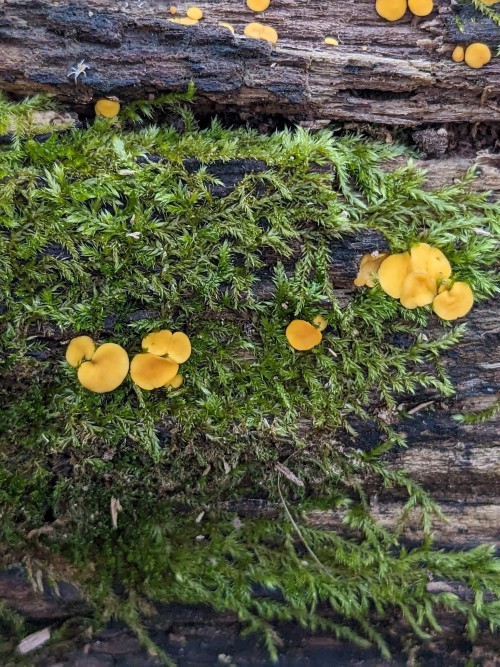
28/Female/Earthling- An amateur naturalist and geology major living in the Missouri Ozarks. Botany 🌿, mycology 🍄, geology 🏔️, foraging 🍓, gardening and more! 🌼🐦🦉🐝 😀 (Natural sciences are my niche.) •iNaturalist ID: oliviarosaline •Rockd Macrostrat Lab: Olivia Myers
86 posts
American Water Willow

American Water Willow
Justicia americana
This native perennial loves water and can be found in very moist habitats. Its native range spans from Texas, throughout much of the eastern United States, to southeastern Canada. I found this blooming plant with purple and white bicolored flowers among a small colony growing in the middle of a shallow creek.
June 6, 2023
Shannon County, Missouri, USA
Olivia R. Myers
@oliviarosaline
-
 ethereal-forest-furry liked this · 3 months ago
ethereal-forest-furry liked this · 3 months ago -
 midlife-imagination liked this · 3 months ago
midlife-imagination liked this · 3 months ago -
 bloomingpixie reblogged this · 4 months ago
bloomingpixie reblogged this · 4 months ago -
 soap-with-bite-marks liked this · 4 months ago
soap-with-bite-marks liked this · 4 months ago -
 soap-with-bite-marks reblogged this · 4 months ago
soap-with-bite-marks reblogged this · 4 months ago -
 drhoz reblogged this · 4 months ago
drhoz reblogged this · 4 months ago -
 drhoz liked this · 4 months ago
drhoz liked this · 4 months ago -
 deadlydoseofart liked this · 6 months ago
deadlydoseofart liked this · 6 months ago -
 deathnographer liked this · 7 months ago
deathnographer liked this · 7 months ago -
 naturesphinx reblogged this · 7 months ago
naturesphinx reblogged this · 7 months ago -
 ninojk reblogged this · 7 months ago
ninojk reblogged this · 7 months ago -
 acarbonbasedlifeform liked this · 8 months ago
acarbonbasedlifeform liked this · 8 months ago -
 gaiawatcher liked this · 8 months ago
gaiawatcher liked this · 8 months ago -
 sam-serac liked this · 8 months ago
sam-serac liked this · 8 months ago -
 lifeissucking reblogged this · 8 months ago
lifeissucking reblogged this · 8 months ago -
 renataoliba liked this · 8 months ago
renataoliba liked this · 8 months ago -
 niwakorchids liked this · 8 months ago
niwakorchids liked this · 8 months ago -
 ecjo6326 liked this · 8 months ago
ecjo6326 liked this · 8 months ago -
 opakakaek reblogged this · 8 months ago
opakakaek reblogged this · 8 months ago -
 balance0101 liked this · 8 months ago
balance0101 liked this · 8 months ago -
 francistreshamthings liked this · 8 months ago
francistreshamthings liked this · 8 months ago -
 theworldismyoysterandiamthepearl liked this · 8 months ago
theworldismyoysterandiamthepearl liked this · 8 months ago -
 speakingofnature liked this · 8 months ago
speakingofnature liked this · 8 months ago -
 abdalla-23 liked this · 8 months ago
abdalla-23 liked this · 8 months ago -
 keepxsolxinxsolxinvictus reblogged this · 8 months ago
keepxsolxinxsolxinvictus reblogged this · 8 months ago -
 hotdishwildflowers liked this · 8 months ago
hotdishwildflowers liked this · 8 months ago -
 keepxsolxinxsolxinvictus liked this · 8 months ago
keepxsolxinxsolxinvictus liked this · 8 months ago -
 emilie786 liked this · 8 months ago
emilie786 liked this · 8 months ago -
 ekmerald4 liked this · 8 months ago
ekmerald4 liked this · 8 months ago -
 sleepybunniberry liked this · 8 months ago
sleepybunniberry liked this · 8 months ago -
 hauntedmeow liked this · 8 months ago
hauntedmeow liked this · 8 months ago -
 devv1321 reblogged this · 8 months ago
devv1321 reblogged this · 8 months ago -
 dreamer-of-serenity liked this · 8 months ago
dreamer-of-serenity liked this · 8 months ago -
 bloomingpixie liked this · 8 months ago
bloomingpixie liked this · 8 months ago -
 reeloflife liked this · 8 months ago
reeloflife liked this · 8 months ago -
 margocooper liked this · 8 months ago
margocooper liked this · 8 months ago -
 shooting-starlight liked this · 8 months ago
shooting-starlight liked this · 8 months ago -
 roroboro-blog1 liked this · 8 months ago
roroboro-blog1 liked this · 8 months ago -
 danielrexi liked this · 8 months ago
danielrexi liked this · 8 months ago -
 asikan liked this · 8 months ago
asikan liked this · 8 months ago -
 erieforage liked this · 8 months ago
erieforage liked this · 8 months ago -
 colo1876rado liked this · 8 months ago
colo1876rado liked this · 8 months ago -
 vuonkhuya liked this · 8 months ago
vuonkhuya liked this · 8 months ago -
 kojiarakiartworks liked this · 8 months ago
kojiarakiartworks liked this · 8 months ago -
 noseysilverfox liked this · 8 months ago
noseysilverfox liked this · 8 months ago -
 thelostcanyon liked this · 8 months ago
thelostcanyon liked this · 8 months ago -
 jonnyhzblog liked this · 8 months ago
jonnyhzblog liked this · 8 months ago -
 badbeavergames reblogged this · 8 months ago
badbeavergames reblogged this · 8 months ago -
 kuzb liked this · 8 months ago
kuzb liked this · 8 months ago
More Posts from Oliviarosaline



Amanita section Validae
I found this gorgeous, lemon yellow amanita mushroom in a healthy bottomland forest surrounded by pin oaks, river birches, and American elms.
July 26th, 2023
Arnold, Jefferson County, Missouri, USA
Olivia R. Myers
@oliviarosaline


Yellow Fairy Cups
Calycina citrina syn. Bisporella citrina
November 22nd, 2023
St. Charles County, Missouri, USA
Olivia R. Myers
@oliviarosaline


Wood Wakerobin
Trillium viride
Endemic to east-central Missouri and south-west Illinois, this trillium species can be found growing in woods with rich soils and on rocky slopes. It blooms in mid to late spring and there are lookalike trilliums; however, T. viride has a characteristic unique only to it - tiny, yet visible stomata that look like white dots all over the top of its leaves.
April 17th, 2024
St. Louis County, Missouri, USA
Olivia R. Myers
@oliviarosaline

Fire Pink
Silene virginica
A perennial catchfly native to central and eastern North America. The bright, fiery red flowers attract ruby-throated hummingbirds to pollinate them, and sticky sepals and stems on the plant act as a trap for small insects trying to climb up it, hence the name "catchfly" for plants in this genus. It prefers somewhat dry soils and part-sun, so it can be found on rocky slopes in open woodlands, savannas, and other similar habitats.
I found this fire pink growing in open, rocky woods near blackjack oaks and other drought-tolerant species.
April 18th, 2024
St. Francois County, Missouri, USA
Olivia R. Myers
@oliviarosaline

#Wolves
I need to say a few words here about Wolves and their role in biodiversity. Because I like them, but most of all, they're a must in the wilderness.
Like every time we are standing on the edge of a hiking trail of a National Park, a protected territory, we all must beware of the consequences.
Au contrary to what most people may think of its surface, no matter how large it might be, isn't big enough to sustain a healthy Wolf population over a long term. This large Predator requires a massive home range to find the prey it needs to survive. Studies have shown that all the Wolf packs in Parks must travel outside its boundaries to meet their needs. And these large Canids are also victims of habitat degradation and fragmentation, not to mention deaths of human origin.
And for people who don't know, Wolves are considered as an umbrella species. Which means that efforts to protect it benefit the entire ecosystem, since the Wolf's territory encompasses the territories of many other species with a similar home range.
As for being an apex Predators, Wolves play an important role in biodiversity. Yes, their presence has been scientifically proven to increase the abundance and diversity of plants, mamal's Birds, Amphibiants, and Reptiles. Wolves help to control the amount of Prey on their territory; this prevents an overpopulation of herbivores, which could be detrimental to plant regrowth. Wolves also give a boost to several other animal species by leaving their partially carcasses for scavengers to feed on. Through its influence on the entire food chain and by curbing excessive grazing. So yes, the Wolf is a key species needed to preserve the balance of Ecosystem.
To conclude; Wolves are very wary and will run away from any human they detect through their remarkable senses of hearing and smell - they can sniff out their Prey from more than 2kms away. Several studies have shown that Wolves will try to avoid humans at all costs and flee when approached.
Just to say that all citizens have a responsibility to protect the Wolves.